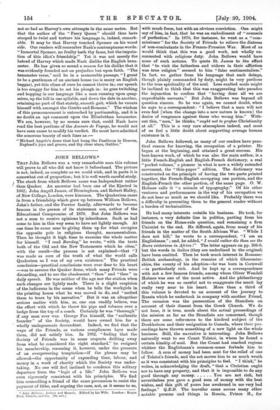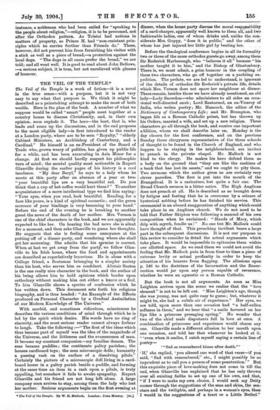JOHN BELLOWS.*
THAT John Bellows was a very remarkable man this volume will prove to all who did not know it beforehand. The picture is not, indeed, as complete as we could wish, and in parts it is somewhat out of proportion ; but it is well worth careful study. The stock from which Bellows came was Independent rather than Quaker. An ancestor had been one of the Ejected in 1662; John Angell James, of Birmingham, and Robert Halley, of New College, London, were kinsmen. The Quakerism came in from a friendship which grew up between William Bellows, John's father, and the Forster family, afterwards to become famous in the person of its statesman son, author of the Educational Compromise of 1870. But John Bellows was not a man to receive opinions by inheritance. Such as had come to him in this way seem to have sat lightly enough. At one time he came near to giving them up for what occupies the opposite pole in religious thought, sacramentalism. Then he thought it high time to examine the whole matter for himself. "I read Barclay," he wrote, "with the texts both of the Old and the New Testaments which he cites," with the result—the process is not explained—that " I was made as sure of the truth of what the world calls Quakerism as I was of my own existence." The practical conclusion—practical conclusions were ever dear to his heart —was to assume the Quaker dress, which many Friends were discarding, and to use the obsolescent " thou " and "thee " in daily speech. He was neither of the age nor the station when such changes are lightly made. There is a slight suspicion of the ludicrous in the scene when he tells the workgirls in the printing house what he was moved to do, and " melted them to tears by his narrative." But it was an altogether serious matter with him, as, one can readily believe, was the effort with which he threw his pipe and tobacco over a hedge from the top of a coach. Certainly he was "thorough" if any man ever was. George Fox himself, the "authentic founder" of the Society, would have owned him for a wholly undegenerate descendant. Indeed, we find that the ways of the Friends, as various compliances have made them, did not satisfy him. In 1882, " feeling that the Society of Friends was in some respects drifting away from what he considered the right standard," he resigned his membership, resuming it, however, under the pressure of an overpowering temptation—if the phrase may be allowed—the opportunity of expending time, labour, and money in a work of charity which the Society was under- taking. No one will feel inclined to condemn this solitary departure from the "logic of a life." John Bellows was even rigorously consistent with his principles. We find him counselling a friend of the same persuasion to resist the payment of tithe, and arguing the case, not as it seems to us, * John Bellows Letters and Memoir. Edited by his Wife. London : Kevin Paul, Trench, and Co. [9s. net.] with much force, but with an obvious conviction. One might say of him, in fact, that he was an embodiment of " counsels of perfection." In 1870, for instance, he went as a " com- missioner " for the Society of Friends to relieve the distress of non-combatants in the France-Prussian War. Most of us would think that this was a good work, not wholly un- connected with religious duty. John Bellows would have none of such notions. To quote St. James to the effect that "to visit the fatherless and widows in their affliction was true religion " seemed to him " false sentimentalism." In fact, we gather from his language that such doings, though plainly commanded by duty, might be very perilous to the true spirituality of the soul. Less exalted souls might be inclined to think that this was exaggerating into paradox the injunction to confess that " having done all we are unprofitable servants." But John Bellows was beyond all question sincere. So he was again, we cannot doubt, when he says to a correspondent : " I believe that a man will not even feel [when the change into a new nature is known] the desire of vengeance against those who wrong him." With- out this, "men," he thinks, "ought not to profess Christianity at all." This is a very rare atmosphere indeed, and most of us feel a little doubt about supporting average human existence in it.
John Bellows followed, as many of our readers have prac- tical reason for knowing, the occupation of a printer. He began at the beginning, and attained a great success. His best-known work, of which he was also the main author, is a little French-English and English-French dictionary, a real " pocket volume," a pioneer in what is now a widely extended movement, the " thin-paper " edition. The dictionary was constructed on the principle of having the two parts printed together, the French-English occupying one portion, and the English-French the other portion, of the same page. ,O. W. Holmes calls it " a miracle of typography." Of his other ventures and performances in the way of his occupation we do not hear as much as we should like. Probably there was a difficulty in presenting them to the general reader without a burden of technicalities.
He had many interests outside his business. He took, for instance, a very definite line in politics, parting from his friends on the Home-rule question, and remaining a firm Unionist to the end. He differed, again, from many of his friends in the matter of the South African War. " While I dare not kill," he wrote to a correspondent, " I am an Englishman " ; and, he added, "/ would rather die than see the Boers victorious in Africa !" The letter appears on pp. 308-9, but the words in italics (they are underlined in the original) have been omitted. Then he took much interest in Romano- British archaeology, in the remains of which Gloucester- shire, the county of his adoption—he was born in Cornwall —is particularly rich. And he kept up a. correspondence with not a few famous friends, among whom Oliver Wendell Holmes was one of the most active. And the philanthropy of which he was so careful not to exaggerate the merit lay really very near to his heart. More than a third of this volume is devoted to an account of the journey to Russia which he undertook in company with another Friend, The occasion was the persecution of the Stundists on account of their dissent from the Greek Church. We do not hear, it is true, much about the actual proceedings of the mission as far as the Stundists are concerned, though there are some references to the kindred subject of the Doukhobors and their emigration to Canada, where their pro- ceedings have thrown something of a new light on the whole business. Still, the narrative is interesting. John Bellows naturally went to see Count Tolstoi, in whom he found a certain kinship of soul. But the Count had reached regions whither the Englishman's common-sense forbade him to follow. A sum of money had been sent for the relief of one of Tolstoi's friends, and the act moves him to as much wrath as it was consistent with his principles to feel. " I think," he writes, in acknowledging the draft, " that a Christian ought not to have any property, and that it is impossible to do any
good through any money You are not rich, but nevertheless you gave a good sum of money with the best wishes, and this gift of yours has awakened in me very bad feelings." Q.E.D. The traveller came across many other notable persons and things in Russia, Prince H., for
instance, a nobleman who had been exiled for "speaking to the people about religion,"—religion, it is to be presumed, not after the Orthodox pattern. As Tolstoi had notions in matters of property, so Prince H. had " non-resistant prin- ciples which he carries further than Friends do." These, however, did not prevent him from furnishing his visitor with a stick as well as a piece of bread,—a protection against the local dogs. " The dogs in all cases prefer the bread," we are told; and all went well. It is good to read about John Bellows, —a serious subject, it is true, but not unrelieved with gleams of humour.







































 Previous page
Previous page